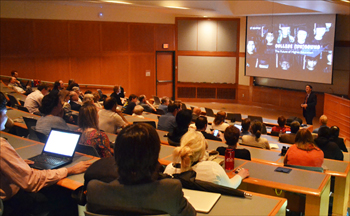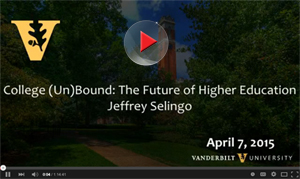
Borders had Amazon.
Tower Records had iTunes.
And so traditional higher education is going to face innovators that challenge it to adapt or fade, said Jeffrey Selingo, author of College (Un)Bound: The Future of Higher Education and What It Means for Students, and former editor of the Chronicle of Higher Education.
On Tuesday, Selingo delivered the School of Engineering’s inaugural Schmidt Family Annual Educational Technologies Lecture. It was created by Douglas Schmidt, the computer science professor who co-taught Vanderbilt University’s first massive open online course (MOOC) in 2013, and his parents, retired Navy Capt. Raymond P. Schmidt and Roberta R. Schmidt.
Selingo addressed MOOCs and other needed innovations in sharing his vision of higher education’s future.
As it stands, he told the crowd at Jacobs Believed in Me Auditorium, universities primarily cater to one type of student: the “young academic,” an 18-22-year-old high achiever seeking the residential university experience. If he finds innovative programs at the universities he visits, they’re hidden at the edge of campus, he said, because school leaders fear any changes that might make them less attractive in national rankings.

The problem is that young academics only make up 24 percent of students, and universities must be more nimble at serving both younger and older students in school specifically over employment concerns – getting the needed education for a specific job or a career shift.
Selingo also advocated for gap years when students would otherwise be “warehoused” at a four-year school — immature, adrift and unsure why they’re there until they join the 400,000 who drop out of college each year.
In the future, Selingo said, college will be “a platform for lifelong learning, where students learn, unlearn and relearn throughout life instead of entering a box and exiting four years later. It will be a much more personalized experience.”
Among those experiences, he said, universities must offer adaptive, competency-based learning, experiential learning, internships and apprenticeships and online hybrid classes.
In the last category, he pointed out opportunities for online education beyond MOOCs. Professors are recording their own lectures and setting up websites outside the auspices of their universities. For example, to acclaimed George Mason economics professors are behind Marginal Revolution University.
Selingo also explained General Assembly, a site offering online and face-to-face tech courses offering specific training to supplement bachelor’s degrees.
He hinted at a book he’s writing now that will cover the problem of skills employers need – strong communication, multitasking, problem solving and collaboration – vs. the skills colleges are set up to impart.
With the nation’s colleges and universities carrying $307 billion in debt and many of them unable to fill their freshmen classes, they must take a different approach, Selingo said.
“In many ways, I see what is happening in higher education as something very similar to the world I was in in the late 1990s, and everyone knows what has happened in the publishing world,” he said.
Contact
Heidi Hall, (615) 322-6614
Heidi.Hall@Vanderbilt.edu
On Twitter @VUEngineering
